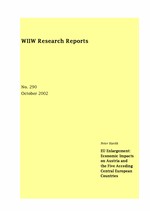EU Enlargement: Economic Impacts on Austria and the Five Acceding Central European Countries
Peter Havlik
wiiw Research Report No. 290, October 2002
38 pages including 19 Tables and 1 Figure
Focusing on Austria and five countries in Central Europe [the Czech Republic, Hungary, Poland, Slovakia and Slovenia (CEC-5)], the paper reviews selected economic developments related to the enlargement of the European Union. Over the past decade, Austria has enjoyed disproportionate gains from the liberalization of trade and capital flows with the CECs. EU enlargement will merely consolidate those gains, not increase them. Apace with the recent global economic downturn, the climate conducive to enlargement has also worsened - just at a time when the accession negotiations were finally coming to a head. Average economic growth in the CECs will be of the order of 3% in both 2002 and 2003; sluggish growth is forecast for Poland alone. After experiencing a setback to its economic recovery, Austria estimates that its GDP growth rate next year will be 2%. Unemployment will also increase, albeit only slightly and still far below CEC levels.
In the medium and long term the candidate countries in Central Europe stand to benefit greatly from entering the EU, although the more immediate costs associated with the adoption of the acquis communautaire will impose an appreciable burden at the outset. None the less, it is quite conceivable that some of the new member states may even become net contributors to the EU budget in the initial post-accession period. On closer study, the outcome of full participation in the European Single Market could well be that EU enlargement is a win-win game. In terms of GDP growth, the CECs on average may well outstrip their EU counterparts by a factor of ten. Of the present EU member states, Austria has gained most from enlargement and will probably continue to do so. Delaying enlargement would be both costly and politically damaging for Europe as a whole. The marked impact of enlargement on growth will induce income convergence in the CECs, thereby reducing potential migration. Given the similar demographic trends in both the present EU member states and the candidate countries in Central Europe, migration and the associated labour shortages may also become an issue of major concern to the CECs. The overall impact on the EU labour market should, however, be limited. Political considerations will play a crucial role in this segment of the accession negotiations.
Austria is one of the CECs' main trading partners. Trade with the CECs has a pronounced positive impact on both Austrian output and employment. By the end of 2001, the FDI inflow into the CEC-5 amounted to nearly USD 100 billion, of which some USD 7.7 billion (8%) came from Austria, thus facilitating further economic expansion on the part of Austrian companies. The additional trade effects of EU enlargement will doubtless remain within certain limits. FDI-related trade will display a certain measure of growth and increases are to be expected in trade in the service sector. The close economic ties show that to all intents and purposes the current political disputes between Austria and certain CECs would seem to have no impact on decision-making processes at the company level. In sum, economic data confirm the growing importance of regional integration in Central Europe and the benefits it yields for all countries concerned.
Keywords: EU enlargement, macroeconomic effects, migration, foreign trade, foreign direct investment
JEL classification: F15, F21, F47, J61, P27
Countries covered: Austria, Czechia, Hungary, Poland, Slovakia, Slovenia, Visegrad countries
Research Areas: Macroeconomic Analysis and Policy, Labour, Migration and Income Distribution, International Trade, Competitiveness and FDI
